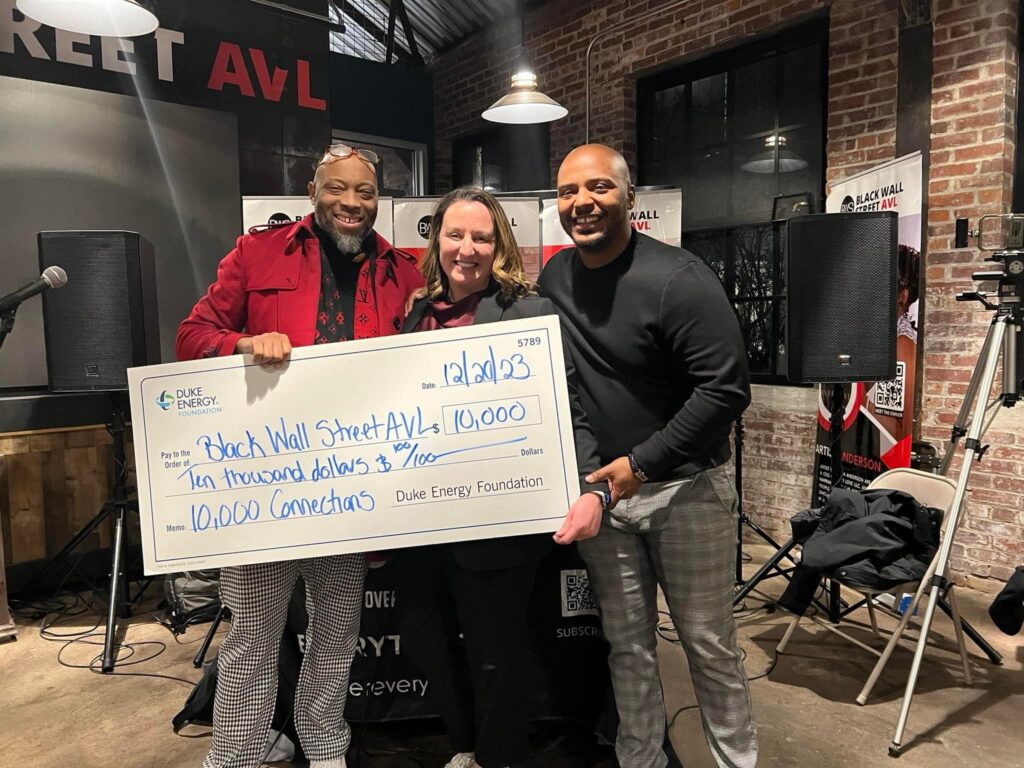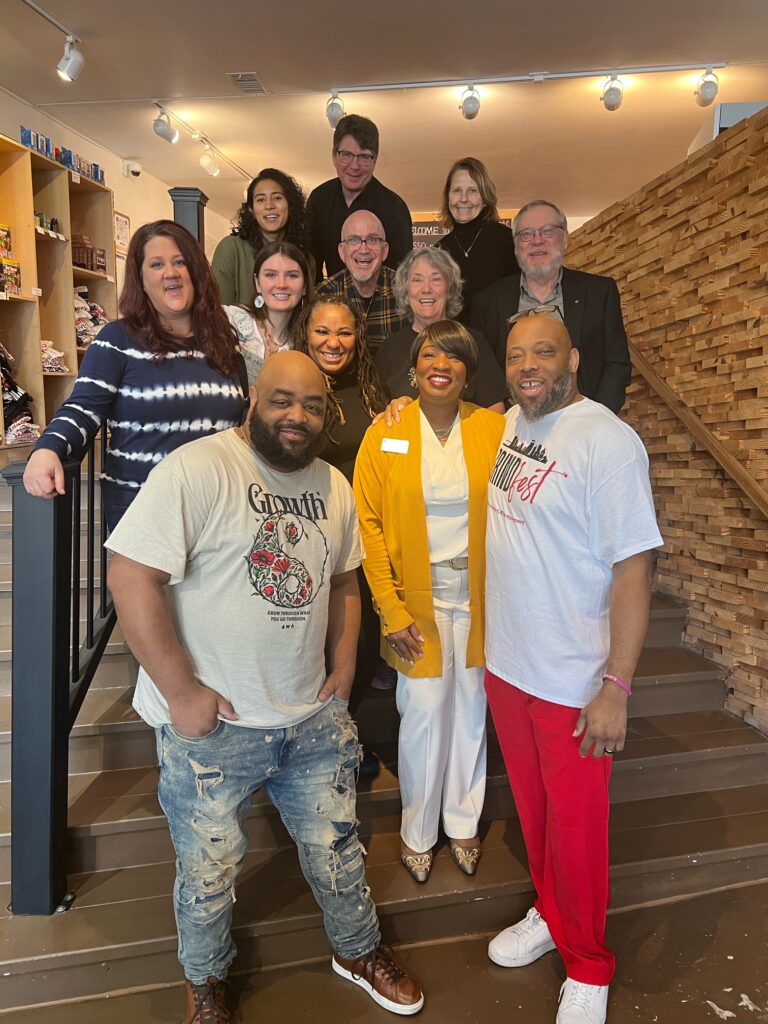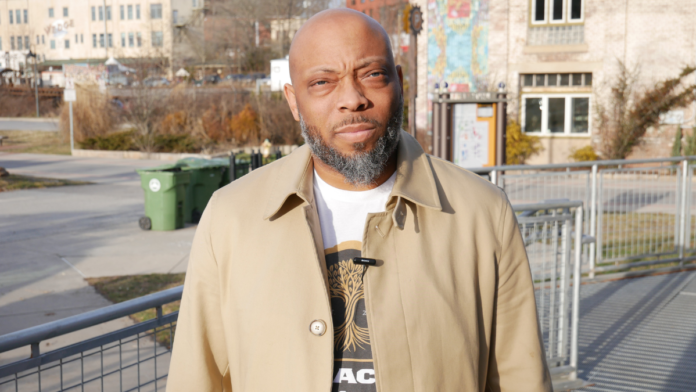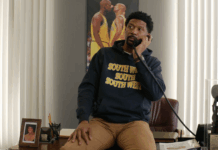( ENSPIRE Business ) J. Hackett Accepted 25 Local Asheville Business Owners into the G.A.T.E. Program
ENSPIRE Contributor: Gabrielle Maya
J. Hackett is a reentry citizen turned business owner whose transformative journey is changing lives and revitalizing communities. He is the founder of Black Wall Street AVL in Asheville, NC. J. a dedicated space where Black business owners can come together and receive the support and resources they need to keep thriving. In addition, Hackett leverages his experiences and connections in the tourism industry, a sector generating $1.9 trillion in economic output, to empower businesses nationwide and help them secure funding opportunities. Hackett’s latest initiative, the Inaugural National Virtual Incubator Program, a webinar series on March 6th and 13th, will promise invaluable insight for Black-owned businesses seeking to fund education within the tourism sector.
“We start, grow, and expand black business to help revitalize Black Wall Street” is their motto! Since its establishment in 2020, Black Wall Street AVL has catalyzed economic empowerment, enrolling nearly 200 companies, generating over $3 million in revenue, and creating numerous job opportunities. By bridging the gap between BIPOC entrepreneurs and Asheville’s $3 billion tourism economy, Most recently, J. Hackett and his team accepted 25 local Asheville business owners into the G.A.T.E. (Greater Access to Tourism) Program, aiming to increase their revenue to $250,000 or more by year-end. Program participants will have the exclusive opportunity to showcase their businesses at Asheville’s premier revenue-generating festival, Grind-Fest, in May. This festival attracts over 12,000 attendees annually and celebrates the achievements of Black entrepreneurs.

J. Hackett shares his journey from reentry citizen to business owner, why Black businesses miss out on funding, how Black Wall Street AVL provides resources for growing Black businesses, entrepreneurship strategies, and more.
Tell us about your journey from reentry citizen to trailblazing business owner. What challenges did you face to get where you are now?
I found myself in prison because of the actions of one of my employees despite not being directly involved in the violation. In the eyes of the law, as the company’s owner, I was responsible. This experience was a valuable lesson in leadership and responsibility. While I excelled in my work’s operational aspects, I lacked business management proficiency. My finances were in surplus, yet I lacked credit, savings, connections, or partnerships. I first decided that business would never run me, but I would run my business.
Next, I chose to surround myself with people who were more intelligent and wiser than me. When I was released from prison, I was still nervous and embarrassed. But most of all, I did not want to make the same mistakes I had made. So, I got serious about checks and balances and hiring experts. Some people see me as brave, and I am—but not in the way they think I am. To me, bravery is the fear of giving up, and I’m afraid to give up. An old church song says, “I just can’t give up now. I’ve come too far from where I started. “And I just can’t give up.” I’ve faced many challenges – many of which I talked about in my talk. They include systemic racism, cultural bias, and outright discrimination against returning citizens. However, I have learned how to turn all of that into progress.
Whatever happens to me, I try to figure out how to make money from it. For example, I wrote a curriculum for returning citizens called “Change of a Lifetime.” It is a guided journal for returning citizens. That guided journal costs $100 because it walks the person through everything it takes for them to start over after prison, jail, treatment, or any life-altering situation.
Organizations purchase this book to guide their programs that service this population. Another challenge is financial literacy. I knew how to make money but didn’t know anything about credit. I ended up buying a truck and paying 22% interest for it. Eventually, I started cleaning up my credit and paying attention to the credit report. I could get another car with a reasonable interest rate, but I still face the challenge of not being able to own property. My restitution shows up as a judgment of $1.5 Million, and I cannot make it through underwriting. So, to this day, I cannot buy a house.
What are five reasons Black-owned businesses miss out on funding opportunities?
People can say it’s someone else’s fault – but it’s not. Black Businesses miss out because of ignorance – they don’t know what they don’t know. They miss out because of false information. They miss out because they are trying to “look good” on the outside instead of having real success. They also miss out because of ego – pretending to know when they don’t and being afraid to ask questions -asking for help. This, mixed with the fact that the system is not set up for us to succeed, is a recipe for failure.
In what ways has Black Wall Street AVL given Black business owners the tools and knowledge to expand?
One of the dBWS companies had an LLC but no revenue. We worked with him to create a business model that used his expertise. We had to help him overcome imposter syndrome, but it worked. Last year, he made almost $300,000 in revenue and is on track to double that this year. These tools and knowledge included business modeling, financial projections, goal setting, and mental toughness.
What are some critical strategies for reentry citizens to secure a second chance and begin their entrepreneurship journey?
I have a simple 3-part strategy that works. #1 Cultivate genuine relationships. You have to let people get to know you as a person and a professional. #2 Connect with stakeholders. You have to learn who to connect with, how, and why. This helps you make more progress in faster ways. #3 Collaborate on projects. Offer your expertise and give other people an opportunity to offer theirs. This is where you do something together with another entity. You serve your way to the top. And, of course, you’ll need to have something to offer that will solve someone else’s problem. Put a price tag on it and go.
What are some travel and tourism industry challenges, and how do you navigate them?
Some of the most significant travel and tourism challenges are when people think it includes them. As consumers, we travel and don’t own the fact that our travel dollars support that destination’s economy. As businesses, we don’t tap into the tourism economies in our region. The AEO tapestry report identified that black businesses fail (as many did in COVID-19) because they serve customers with limited spending power. People must learn how to package and repackage their services for an audience that can and will pay. Sometimes, that audience is outside of your community. But this is the only way we can bring money in – by having a product that we sell to them, so there is a reason for the wealth to transfer.
We navigate challenges by getting into the mix. We encourage people to “follow the money trail.” Money in a community is like Blood in a body—as long as money is moving, it’s healthy. When money stops moving to a certain area, it decays and suffers. But what happens if you can find the heart that drives the blood flow? For many areas—especially ours—tourism is the heartbeat, so we connect there.

What can you tell us about the Inaugural National Virtual Incubator Program, which will be held on March 6th and the 13th?
Sometimes, people think that their local challenges are unique to their communities. Some of them are. But, “the game doesn’t change.” The challenges we face here in Asheville are similar to those in Charleston, Austin, Seattle, Phoenix, Orlando, etc – the local BIPOC businesses do not benefit from the tourism economy. At best, local people get jobs – hopefully living wage jobs – and everyone appears happy. But that’s not enough. During these sessions, we lay out a strategy any business can use to tap into their local tourism economy and generate revenue for their companies.
You and your team recently accepted 25 local Asheville business owners into the G.A.T.E. Program. Please tell us what this means and how the revenue will impact these owners. What doors have been opened?
This new cohort is multi-faceted. Some are already opening their businesses, but others are just starting. The GATE program is an acronym standing for Greater Access to Tourism Entrepreneurship. We are connecting local BIPOC businesses to the resources and networks already available in our region so they can thrive and do more business, generating more revenue. This revenue will cause them to have a better quality of life and establish more financial independence.
Our motto is Honoring History and Building Wealth together. Our region’s average median Income (AMI) is disparate between black and white community members. Black people’s AMI is $29k/year, but White people’s AMI is $69k/year. By tapping into tourism as the local economic driver, we bring them closer to the lowest-hanging fruit.
The doors that have been opened already include our Tourism Development Authority which receives money from hotel tax. Explore Asheville partners with us as well as local non-profits and businesses seeking to diversify their suppliers.
Can you offer insight about Grind Fest, what attendees can anticipate when arriving, and what they will take away from this experience?
GRINDfest is the annual celebration of black business and entrepreneurship. Attendees can expect “Good old-fashioned FUN.” Life has become so complex, but what if we could have just one weekend where you can chill out and enjoy black businesses? That’s what GRINDfest is all about. Some people will arrive on Thursday and participate in the Pre-Party at Radical Hotel. Some people will arrive on Friday and join our Casino Night setup, like Harlem Nights from the 20s. On Saturday, we’ll have carnival rides, food, music, games, line dancing, and vendors from all over. Last year, we had about 10,000 people from 35 states and 107 cities nationwide. Folks will leave with connections and memories of something uniquely local and exciting.
How do we as a community address the barriers that Black-owned businesses are exposed to when accessing financing assistance? What are some solutions you suggest that will break down these walls?
You cannot solve a problem with the same brain that created the problem. So, addressing barriers requires a new mindset, ideas, and approaches. I call it the Moses and Pharoah syndrome. On one side, you must tell Pharoah to let my people go. You have to go to your people, close the door behind you, get in a huddle, and say “All right yall – this is our opportunity – we gotta get ourselves together so we can get out of here.” We have to be honest with our people about what they need and what they need to do. We cannot access new stuff with old mindsets, so it takes internal work. But I believe that when people are sick and tired of being sick and tired, they’ll be ready for change. It’s time to build. And building requires work. But we’ve been doing it in this country for other people for hundreds of years. Now it’s time to do it for ourselves.
J. Hackett has impacted Black-owned businesses in many industries and given them the tools and knowledge to expand and go forward. His business, Black Wall Street AVL, is not the only thriving Black business he has. GRIND AVL, Asheville’s first black-owned coffee shop, is recognized as the #1 fastest-growing startup in Asheville, the #1 minority-owned business in WNC, and the #3 best coffee shop in North Carolina. Go to Grind-Fest in May tickets here.
Related Articles: Tiffany LaTrice Brings Black Female Artists Opportunities & Funding, Four Amazing Black Businesses to Support Right in Springfield, MA










